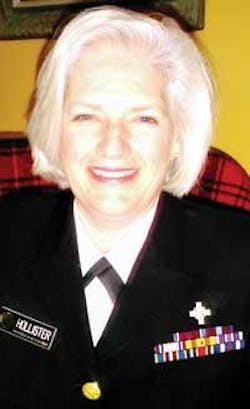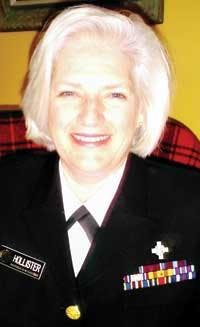The commissioned corps
The mission of the Public Health Service (PHS) Commissioned Corps is to provide highly-trained and mobile health professionals who carry out programs to promote the health of the nation, understand and prevent disease and injury, assure safe and effective drugs and medical devices, deliver health services to federal beneficiaries, and furnish health expertise in time of war or other national or international emergencies. Dental hygienists serve in the health services category of officers. The Health Services Officers (HSO) category represents approximately 10 percent of all PHS commissioned officers.
Commander Cathy Hollister is a dental hygienist that works as a Commissioned Officer with the United States Public Health Service. She has been honored with over 10 awards in the Public Health Service and recently received the Navajo Area Director’s Award for Health Promotion.
She has published articles on Health Behavior Models and Oral Health in a variety of periodicals and has presented talks on oral health all over the nation. Cathy has presided as Chair of the American Dental Hygienists’ Association Council on Public Health and contributed to the ADHA Focus on Advancing the Profession paper. Commander Hollister has been instrumental in enhancing dental hygiene’s role in dental public health in a variety of venues and organizations. She is constantly driven to build coalitions to effectively improve oral health status and the methods we use to deliver care.
Since her tenure as Service Unit Prevention Officer, she has worked to reduce the incidence of early childhood caries. She accomplished this by collaborating with the Women, Infants’ and Children’s Clinics (WIC). She has also developed a course to teach dental hygienists and dentists how to effectively plan and evaluate public health programs.
Cathy Hollister has accomplished so much in her career. She constantly promotes the skills of dental hygienists by effectively practicing dental hygiene in a variety of roles, subsequently providing quality care to the public.
I asked her several questions regarding her career.
Why did you decide to go into dental hygiene?
I knew I wanted to be in a health related field. After high school I volunteered in my dentist’s office. I had a chance to observe many dental procedures, and I knew I wanted to work in dental care.
After practicing dental hygiene for a few years, I considered going back to dental school. I thought about it for a long time and decided I really wanted to stay in dental hygiene. I enjoyed the preventive side of dentistry and wanted to help people stay healthy rather than treat disease after it occurred.
How did you get into dental public health? Did you need additional education?
After working in private practices for eight years, I went to work in a community health center. That was my introduction to public health. I conducted a fluoride mouthrinse program in the schools and also offered classroom education in many schools. Many of the students in the schools rarely saw a dentist, and the education they received at school was their only opportunity to learn about dental health and take control of their own oral health. I saw this as a real opportunity to improve the oral health of a large group of people, many of whom could not or did not have regular dental visits.
I knew I wanted to work in public health. I also knew I needed more education. At the time I had an associate’s degree in dental hygiene. I entered a certificate completion program to finish my bachelor’s degree. Immediately following, I began my master’s in public health. I had some public health education in my dental hygiene programs but my MSPH gave me an excellent foundation for my present position.
I work in the United States Public Health Service and after seven years in PHS I entered a program to earn a doctorate in health services. I thought this education would help me improve the delivery of oral health services. I did my doctorate at a distance education university that allowed me great flexibility. I was able to study issues in oral health that affected utilization of health services, health education, and health-care systems.
What is your current position?
Currently, I am the Dental Prevention Officer with the Indian Health Services Gallup Service Unit, in Gallup, N.M. Additionally, I am the director of a dental hygiene clinic I developed and Chair of the Medical Ethics Committee at Gallup Indian Medical Center. I also am an adjunct faculty member at the University of New Mexico, Division of Dental Hygiene in Albuquerque.
Please discuss any particularly interesting experiences you have had in your dental public health positions.
I have found it quite interesting to learn about the political side of health care. When I first began working in schools, I found that teachers may want to offer health education or services but could not because of so many demands on classroom time.
Nursing home aides wanted to do oral hygiene for the residents but often did not because of lack of time or because many residents needed dental services and none were available to them.
Public health has caused me to think about more than “How many patients do I have to see in a day?”
Public health has caused me to look past individual clinical care and look for community partners. I have had the opportunity to work with Head Start, Women, Infants and Children (WIC), diabetes programs, nursing homes, and schools. The most interesting and challenging aspect of working in public health has been finding common ground with nondental groups to increase oral health education, empower individuals to take charge of their own oral health, and increase access to dental services.
What type of advice would you give to a practicing hygienist who is thinking of doing something different?
First, enter a field you have a passion for. Secondly, make sure it is the right time in your life to make a change.
Thirdly, get adequate education or training. On-the-job training may be adequate if the change is very closely related to your current position; but if it is a major change, consider a degree program.

